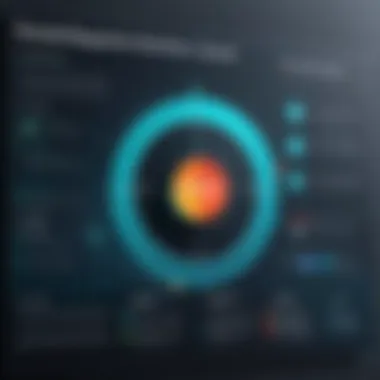Understanding Social Reputation Score: Implications


Intro
In an age where digital presence is crucial, understanding one's social reputation score becomes imperative. This score, derived from numerous data points, reflects how individuals or businesses are perceived online. It acts as a digital fingerprint, influencing opportunities, relationships, and career prospects.
A social reputation score can be shaped by various factors such as online activity, interaction quality, and even the sentiments expressed through posts or comments. Ultimately, recognizing the factors that contribute to this score can significantly influence personal brands and business reputation management.
Key Features
Overview of Features
Social reputation scores are multifaceted and encompass several key features:
- Data Sources: Information is pulled from social media, websites, and forums. Platforms like Facebook and Reddit play a central role, as user interactions here greatly impact scores.
- Algorithmic Assessment: Machine learning algorithms analyze online behavior. These algorithms evaluate engagement levels, content shared, and interactions to generate scores.
- Sentiment Analysis: The tone of online interactions also matters. Positive engagement enhances reputation, while negative reactions can lower it.
Unique Selling Points
The distinct advantages of focusing on social reputation scores include:
- Comprehensive Insights: They provide a holistic view of digital presence, informing strategies for improvement.
- Real-Time Feedback: Social reputation scores can change rapidly in real-time, allowing quick responses to interactions.
- Strategic Branding Tool: Businesses can leverage these insights to adjust marketing strategies, ensuring alignment with audience perceptions.
Performance Evaluation
Speed and Responsiveness
In the digital arena, the speed of data processing is vital. Social reputation scores are typically updated frequently, reflecting the latest activities and interactions. This speed enables users to receive timely insights, allowing for quick adjustments to their online strategies.
Resource Usage
While assessing a social reputation score, it is essential to consider the resources that support this process. Effective algorithms require adequate computational power and data input, influencing the efficiency of score generation. However, many online tools tend to optimize resource usage, ensuring users can access their scores without excessive delays or resource drain.
"A robust understanding of social reputation scores leads to informed decision-making and strategy development, aligning personal and professional methods with public perception."
In sum, the multifaceted elements of social reputation scores present invaluable implications for individuals and businesses alike. By delving into various factors influencing these scores, stakeholders can effectively navigate their digital landscapes.
Prelude to Social Reputation Score
The social reputation score represents an increasingly pivotal metric in today’s digital ecosystem. As individuals and organizations alike build their online presence, the implications of these scores cannot be overstated. They impact everything from personal branding to corporate credibility. Understanding social reputation score is, therefore, key for anyone wishing to navigate the complexities of online interactions more effectively.
Definition and Relevance
A social reputation score quantifies an individual's or organization’s standing based on various online activities and interactions. This score stems from aggregated data reflecting user engagement, content quality, and network influence. For instance, higher engagement metrics, such as likes and shares, often indicate stronger social relevance.
The relevance of this score extends beyond mere numbers. It fosters trust, enhances visibility, and can be a decisive factor in professional opportunities. As individuals or businesses manage their reputations online, a good score can lead to enhanced collaborations, partnerships, or consumer trust.
Historical Context
The concept of reputation is not new. Historically, reputations were built in local communities through word-of-mouth and personal interactions. With the advent of the internet and social media, reputations are increasingly constructed through digital footprints. Initially, reputation management focused on minimizing negative feedback. Over time, this evolved into a more nuanced approach that prioritizes fostering positive engagement and creating valuable content. As social media platforms like Facebook, Twitter, and LinkedIn gained traction, they became vital in shaping public perceptions. This shift marked the beginning of a systematic approach to analyzing social reputation through measurable scores, paving the way for current methodologies.
"In the digital age, reputation is an ongoing conversation, not a static measure."
Understanding historical developments informs current practices in managing social reputation scores. From simple metrics to sophisticated algorithms, tracking and enhancing these scores has become essential for individuals and organizations navigating today's complex digital landscape.
Key Components of Social Reputation Scores
Understanding social reputation scores requires a clear grasp of their key components. Each element contributes to the overall assessment of an individual's or organization’s digital footprint. Focusing on user engagement metrics, content quality, and network influence provides valuable insights into how reputation is formed and maintained in online spaces. These components not only highlight the essential factors that influence reputation but also guide effective management strategies for users and businesses.


User Engagement Metrics
User engagement metrics play a critical role in shaping social reputation scores. These metrics can be thought of as the quantitative reflection of how audiences interact with content. Key metrics like likes, shares, comments, and follower growth indicate the level of interest and involvement from users. Higher engagement rates often suggest that the content resonates with the audience, enhancing reputation.
Measuring engagement is not just about counting numbers. It’s vital to analyze quality of engagement. For instance, a high number of comments can reflect both positive discussions or negative backlash. Therefore, sentiment analysis becomes an important tool in this aspect. Using tools such as social media analytics platforms can help track these metrics effectively. Doing so enables both individuals and businesses to adjust their strategies based on real-time feedback, fostering a more favorable reputation.
Content Quality Evaluation
The quality of content is paramount in determining social reputation scores. Content is often what attracts initial attention and keeps users engaged. High-quality content is characterized by various factors, including originality, relevance, and accuracy. For technical communities like software development, content that provides value, such as tutorials or case studies, tends to be viewed more favorably.
Evaluating content quality also involves understanding the target audience. Different demographics have distinct preferences. Tools like Grammarly or Hemingway can assist in ensuring clarity and readability, while incorporating SEO practices can enhance visibility. A well-researched and thoughtfully presented piece not only contributes to a positive reputation but also positions the creator as an authority in their field.
Network Influence Assessment
Finally, network influence assessment is crucial for evaluating social reputation scores. This component examines not only one’s direct network but also the influence those connections carry. For example, a tweet from a highly regarded developer can significantly boost visibility and credibility for a lesser-known individual.
Ranking algorithms often consider the quality and authority of connections. Measuring influence can involve looking at metrics such as Klout scores or peer recognition within specific circles, such as GitHub stars for developers. Understanding one's network can help tailor content strategies, ensuring that messaging reaches the right audience effectively.
In summary, recognizing the key components of social reputation scores allows for a more strategic approach to managing one’s online presence. By focusing on user engagement metrics, content quality evaluation, and network influence assessment, individuals and organizations can enhance their perception and build a strong reputation in digital environments.
Calculating Social Reputation Scores
Calculating social reputation scores is essential for individuals and businesses in today’s digital landscape. This section unpacks the critical elements that contribute to these calculations, the methodologies applied, and the diverse benefits of understanding these scores. In an era where online presence can dictate personal and professional opportunities, having a clear grasp of how these scores are derived is crucial.
Algorithms and Methodologies
The algorithms used in calculating social reputation scores form the backbone of how reputations are assessed online. Most systems incorporate complex mathematical models that evaluate a variety of data points. These may include user engagement levels, content quality factors, and network influence metrics.
Commonly, machine learning techniques help refine these algorithms over time, ensuring they adapt to changing user behavior and digital trends. For instance, algorithms like the ones used by platforms such as Facebook and Twitter analyze interactions not simply based on quantity, but also on the nature of engagements. Therefore, a share or comment might count differently compared to likes. This weighting of engagement types provides a more nuanced view of how individuals or brands are perceived online.
It is worth mentioning the relevance of transparency in these methodologies. Stakeholders must understand how data is processed to maintain trust in the scores generated. Those who wish to improve their reputation should also focus on these algorithms and learn how they can positively influence their scores.
Data Sources and Collection
The data sources utilized for calculating social reputation scores are varied and manifold. Typically, they combine public data from social media platforms, websites, and user-generated content across forums and blogs. Key sources include:
- Social Media Metrics: Data from platforms such as Twitter, Instagram, and LinkedIn contributes immensely. These include follower counts, engagement rates, and content shares.
- Public Reviews and Ratings: Sites such as Facebook and Yelp provide crucial feedback from users, often impacting service-oriented businesses directly.
- Content Analysis Tools: Tools like Google Analytics help in understanding audience behavior and content effectiveness, which feeds into reputation scores.
The collection of such data comes with particular considerations. Privacy issues must be handled carefully, ensuring that personal information is not misused. Furthermore, keeping the data up to date is vital, as outdated information can paint an inaccurate picture of one's reputation.
The Impact of Social Reputation Scores
The impact of social reputation scores cannot be understated in today's digital landscape. Social reputation scores influence various aspects of online presence and interaction. For individuals, these scores shape personal branding, while businesses leverage them to enhance their market position. Understanding this impact is essential for navigating the complexities of online reputation management effectively.
On Personal Branding
Personal branding significantly benefits from a positive social reputation score. Individuals who maintain a good reputation score are often perceived as credible, trustworthy, and successful. This perception fosters connections with peers, clients, and employers. A strong personal brand enhances visibility in a crowded online space.
- Influence of Score: A higher score often leads to increased opportunities for networking and collaboration, providing individuals with a competitive edge.
- Online Presence: People with good scores attract followers and engagement on platforms like Facebook or Instagram, creating a robust online persona.
- Reputation Repair: Conversely, low scores can damage personal branding, making recovery a challenging process. A strategic approach is necessary to improve these scores and reshape public perception.
For Businesses and Organizations
For businesses and organizations, social reputation scores are vital for maintaining a positive image. Consumers increasingly rely on online reviews and ratings to form their opinions. High social reputation scores enhance brand loyalty and customer trust.
- Customer Trust: Businesses with high scores are more likely to attract and retain customers. Positive scores can reduce customer acquisition costs and foster brand advocacy.
- Market Position: A strong reputation enables businesses to differentiate themselves in the marketplace. Companies known for quality and integrity often see improved sales and customer retention.
- Crisis Management: Managing a business's score during negative events requires careful planning and strategy. Mitigating damage often depends on effective communication and engagement with stakeholders.


Effects on Employment Opportunities
Social reputation scores play a crucial role in employment opportunities. Recruiters frequently evaluate candidates based on their online presence. A positive score can enhance a candidate's appeal.
- Recruitment Process: Employers often research potential hires on platforms like LinkedIn. A strong reputation score can be a deciding factor in hiring decisions.
- Career Advancement: Professionals with higher social reputation scores may find better opportunities for promotions and career development.
- Job Security: Maintaining a good score adds a level of job security. Individuals perceived as positive contributors often experience lower turnover rates.
A well-managed social reputation can serve as a powerful career tool, influencing perception and opportunities in significant ways.
Understanding the implications of social reputation scores is crucial for both individuals and organizations. It not only shapes personal branding but also influences business strategies and employment prospects. By prioritizing reputation management, stakeholders can navigate the complex digital space more effectively.
Case Studies of Successful Reputation Management
Understanding successful reputation management is essential in a time when online presence influences many aspects of business and personal branding. An effective reputation strategy can lead to increased customer trust, higher sales, and better career opportunities. Case studies highlight real-life examples where organizations or individuals implemented strategies to improve their social reputation scores. Studying these cases allows us to identify practical approaches and avoid past mistakes.
Small Business Strategies
Small businesses often struggle with establishing a reputation in a crowded market. By studying successful cases, we see some key strategies emerge.
- Community Engagement: Local businesses that actively engage in community events often build strong relationships. For instance, a small café that sponsors local arts programs not only boosts local goodwill but also enhances its reputation score through positive local interactions.
- Social Media Utilization: Many successful small businesses effectively use platforms like Facebook and Instagram to communicate directly with customers. Create authentic content that resonates with target audiences helps in establishing a positive image. For example, a local bakery sharing behind-the-scenes videos of the baking process fosters connection and transparency.
- Customer Feedback Integration: Businesses that actively seek and respond to customer feedback demonstrate a commitment to improvement. A home services company may ask clients for reviews on social media, happily resolving issues publicly. This shows potential customers that the business values its client relationships.
Corporate Reputation Enhancements
Corporations face different challenges but can also learn from case studies in reputation management. When analyzing major brands, several strategies stand out as effective:
- Crisis Management Plans: Well-planned responses to negative events can minimize damage to reputation. For example, a major airline faced backlash after a passenger removal incident. They launched an apology campaign and revised their policies, which eventually improved their social reputation score over time.
- Sustainability Initiatives: Companies prioritizing socially responsible practices often experience improved reputation scores. For example, a tech giant invested heavily in renewable energy and publicized its efforts through various media channels. This not only appeals to environmentally conscious consumers but also enhances their corporate image.
- Employee Advocacy: Engaging employees in reputation management creates advocates for a brand. A firm may do this by investing in employee training and benefits. Happy employees often share positive experiences online, thus amplifying the brand's reputation on the internet.
Challenges in Managing Social Reputation Scores
Understanding the challenges associated with managing social reputation scores is crucial for individuals and organizations alike. This section delves into two significant facets: misinformation and negative press, as well as algorithmic bias and transparency issues. As the digital landscape evolves, so do the complexities of maintaining a favorable reputation online.
Misinformation and Negative Press
One dominant challenge in managing social reputation scores stems from the prevalence of misinformation. In today's world, false information can spread rapidly through social media platforms, impacting perceptions dramatically. A singular negative event or misleading narrative can tarnish an otherwise positive reputation.
Factors to consider when dealing with misinformation include:
- Source verification: It is vital to determine the credibility of sources before sharing information.
- Crisis management strategies: Establishing a plan to respond to negative press can mitigate damage. Being reactive is not enough; proactive measures are necessary.
- Monitoring tools: Utilizing media monitoring tools can help track mentions of a brand or individual, allowing for timely responses.
Organizations and individuals must be vigilant in addressing misinformation swiftly. An effective strategy may involve directly engaging with audiences to clarify misunderstandings. By maintaining a transparent and honest dialogue, it is possible to rebuild trust and counteract negative impressions.
"A reputation is built over time, but can be lost in an instant through misinformation."
Algorithmic Bias and Transparency Issues
The second significant challenge relates to algorithmic bias and transparency in how social reputation scores are calculated. The algorithms used to analyze user data may unintentionally favor certain groups or perspectives. This bias can skew reputation scores, presenting an inaccurate picture of an individual's or brand's standing.
Key considerations include:
- Understanding algorithm mechanics: Knowing how algorithms assess data is fundamental in mitigating bias.
- Advocating for transparency: Encouraging platforms to disclose their scoring methodologies can foster trust.
- Diverse representation: Ensuring diverse user input in algorithms can reduce bias and enhance accuracy.
Addressing these challenges requires collaboration between stakeholders, including developers, organizations, and platform providers. Only by working together can we create a more equitable system for social reputation management. The significance of these issues cannot be overstated, as they directly impact social interactions and perceptions in a digital age.
Future Trends in Social Reputation Scoring
Future trends in social reputation scoring are pivotal for understanding how individuals and organizations will manage their digital identities. As the digital landscape progresses, reputation management increasingly intertwines with emerging technologies and changing user behavior.


Emerging Technologies and Innovations
Advancements in technology will significantly shape the way social reputation scores are calculated and perceived.
- Artificial Intelligence (AI): AI tools will enhance data analysis, making it easier to identify patterns in user behavior. Machine learning algorithms can detect signals of authenticity and engagement, refining scores based on more nuanced interactions. This leads to more accurate assessments than ever before.
- Blockchain Technology: This technology holds promise for security and transparency in reputation management. Blockchain can create immutable records of interactions, aiding in the verification of claims made by users. As users increasingly value transparency, this could revolutionize how businesses maintain their reputation.
- Sentiment Analysis: The development of sentiment analysis tools allows for real-time processing of social media interactions. These tools can provide immediate feedback on the public's perception, thus enabling organizations to adjust their strategies promptly.
By embracing these technologies, businesses can anticipate shifts in user expectations and adapt their reputation management strategies accordingly.
Changing User Behavior and Expectations
User behavior is in constant evolution, influenced by both technological advancements and societal shifts. Users today demand more accountability from brands and individuals they interact with online.
- Increased Scrutiny: With rising awareness of the significance of social reputation, both individuals and organizations face heightened scrutiny. Users are more likely to research reputations before engaging. A negative reputation can deter potential customers or employers. Thus, managing social reputation is now crucial for success.
- Desire for Authenticity: There is a growing preference for genuine and authentic representations. Users favor brands that align with their values, which means those that appear phony can face backlash. Organizations must ensure their messaging aligns with their reputation.
- Active Participation: Users are increasingly active in shaping reputations. Platforms like Reddit and Facebook allow for public discourse. Thus, companies are now more vulnerable to public opinion that can change quickly based on social media trends.
"In the world of digital interactions, reputation is a currency. Unrealized potential lies in effective management of that currency."
Integrating Social Reputation Scores with Business Strategies
Integrating social reputation scores within business strategies is essential in today’s digital landscape. A strong online reputation can significantly influence a company’s success and sustainability. Organizations leveraging their social reputation scores can gain insights into customer perceptions and market positioning. This knowledge assists them in making informed decisions.
Setting Goals and Metrics
To effectively integrate social reputation scores, businesses need to establish clear goals and metrics. These goals should align with the overall business objectives, such as increasing brand awareness or improving customer loyalty. Some common metrics to consider include:
- Engagement Rates: Measuring likes, shares, and comments on social media.
- Net Promoter Score (NPS): Assessing customer sentiment towards the brand through surveys.
- Brand Mentions: Keeping track of how often the brand is mentioned across various platforms.
By setting these metrics, businesses can monitor progress over time. For example, if a company aims to increase engagement, they must regularly track engagement rates to understand what content resonates with their audience.
Continuous Improvement Processes
Continuous improvement is key to maintaining a positive social reputation score. Business strategies should be adaptive, allowing organizations to evolve based on feedback and data analysis. Steps in this process might include:
- Regularly Review Metrics: Analyze collected data to identify areas of strength and weakness.
- Implement Feedback Loops: Encourage customers to provide feedback, both positive and negative, and act on their suggestions.
- Adjust Strategies: Based on the data insights, tweek marketing strategies or customer service approaches to address issues.
It is important to remember that reputation management is not a one-time task but an ongoing effort.
"A positive online reputation can lead to increased trust and business opportunities."
By embedding social reputation scores into their operational framework, organizations can better align their actions with both customer expectations and market dynamics. This integration ultimately leads to enhanced customer relationships and a stronger market presence.
End and Recommendations
Moreover, as we have seen, managing these scores is not without its challenges. Misinformation and negative publicity can severely undermine efforts to maintain a positive reputation. Thus, businesses and professionals must approach reputation management with a strategic mindset, leveraging insights from historical context and future trends to inform their decisions.
The recommendations laid out in this final section will guide individuals and organizations in harnessing social reputation scores effectively:
Summarizing Key Insights
It is essential to distill the essential points covered throughout the article. Key insights include the following:
- Reputation scores matter: They have direct implications on personal and organizational trustworthiness.
- Quantitative and qualitative measures: A combination of user engagement and content evaluation must be examined holistically.
- Dynamic environment: The landscape of social reputation is always evolving; ongoing monitoring is crucial.
- Strategic integration: Smart use of evaluation metrics within broader business strategies can cultivate long-term benefits.
"Understanding your reputation score is the first step toward managing it effectively."
Practical Steps Moving Forward
As readers consider their social reputation management strategies, several practical steps can be implemented:
- Assess Your Current Score: Utilize available tools to evaluate your social reputation score. Platforms such as Facebook and LinkedIn offer insights on how you are perceived.
- Engage Consistently: Regular interaction with your audience, whether through professional networks or personal channels, contributes positively to reputation scores.
- Quality Content Creation: Prioritize producing high-quality content that adds value to your audience—this shows commitment to excellence and builds trust over time.
- Monitor Feedback: Keep an eye on user interactions and responses. Addressing negative feedback promptly can mitigate damage to your reputation.
- Stay Updated: Follow emerging trends and technologies related to reputation scoring, as they can offer new opportunities or insights.
By following these recommendations, readers can better position themselves in managing their social reputation scores, fostering improved personal and professional relationships.







